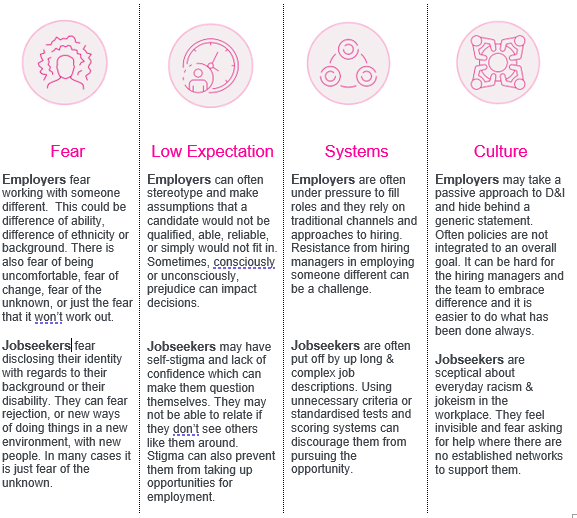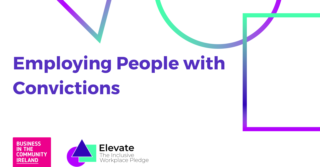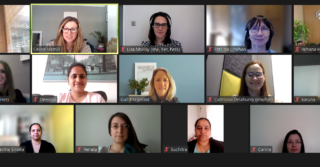Barriers to inclusion and how to overcome them
From a moral sense we know Diversity and Inclusion is the right thing to do. We also know there is a strong business case for inclusion. Businesses are committed and formal statements are issued to welcome one and all to be a part of their organization. However genuine these statements are, the reality is, certain groups within our society face significant barriers to employment.
To gain an understanding of these barriers and how they can be overcome, BITCI commissioned a series of focus groups in early 2021. The barriers to inclusion were explored from both the employer and the jobseeker’s perspective and similar themes came out from both groups.
The four key themes that came out of the focus groups are:
This research also offers key insights into how such barriers can be addressed and overcome.
Job Descriptions
Job descriptions often include un-necessary requirements and jargon or use overly complex language and focus on long lists of requirements. The tendency is to also default to full time roles and standard hours.
Ask yourself – What profile of candidate might be encouraged to apply if the job was described simply in terms of core skills or expertise and if part time hours or flexible conditions were built into the job design?
Traditional Recruitment Process
Traditional recruitment screens out. What would happen if the process was designed to screen in? All candidates that meet minimum requirements necessary for the role are included in first round of the selection process. Think about the selection process and how best to assess ability to do the job. Not everyone demonstrates their potential through an interview.
Ask yourself – Are there options to assess candidates on the job?
Development and Progression
Often employers make significant investment in pre-employment initiatives. However, post entry support is also needed. Establishing a support network across the business for all employees helps with onboarding and paves the way for ongoing development. Facilitate buddying and mentoring initiatives along with employee resource groups to build skills as well as confidence and resilience.
Ask yourself – Do you know if there is any bias in who gets promoted or offered the best projects/clients? What initiatives can you put in place to ensure you retain diverse employees?
Education and Training
Education and Training is key to over-coming fear that can exist around inclusion, and to tackle bias and challenge stereotypes. Train managers to manage diverse teams, to have challenging conversations and to get comfortable discussing the uncomfortable. If a new employee requires certain accommodations, brief immediate colleagues on what to expect and encourage open conversations to allay fears and create support.
Ask yourself – What training do you offer to promote inclusion?
Role Models
Role models are important in paving the way for others to follow and they have the power to inspire people that opportunities exist. Share stories from both employee and employer perspective but avoid having a ‘poster’ person when it comes to showcasing success.
Ask yourself – How do you demonstrate that you have an inclusive culture? Can you see your city, town, customers in your workplace?
Equal Opportunities
Demonstrate authentic commitment by defining how you are an inclusive employer. Articulate practical examples of how your culture supports Inclusion. For example, in an invitation to interview, include a menu of accommodations available. Aim to create a situation where candidates feel safe to disclose information and avail of appropriate supports.
Ask yourself – What does your equal opportunities statement say about your workplace?
As with any hire, sometimes it just won’t work out. A new employee might start well and seem to be settling in, but they may experience one set-back either at work on in their personal life and everything falls apart. Other times even if the employer does everything right it might just not be the right fit. It is understandable to be disappointed if this happens, but it is important to recognise that there is always a chance that a new employee won’t make probation regardless of their pathway into the business. The general experience is that if an employee gets the right supports, they thrive and retention follows.
Find out more about our Inclusive Workplace Pledge, Elevate.







